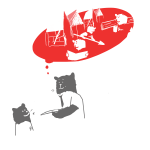I’m not particularly good at laying bricks.
Yet about a year ago, over spring break, I found myself doing just that for a non-governmental farmer-support organization in rural Nicaragua with 10 other UCLA students – none of whom were any more adept than myself at masonry.
These trips – dubbed alternative spring breaks – enjoy a considerable popularity in the college community. The undergraduate student government alone has enrolled 51 people on four different trips, and a host of other student organizations offer similar opportunities, said community service commissioner Anees Hasnain, a fourth-year sociology student.
But despite the vogue these trips have garnered, many of these programs run afoul of an economic principle called comparative advantage.
As any student who has sat through Professor Michael Sproul’s perennial Economics 1 lectures can tell you, comparative advantage can best be illustrated by the doctor who mows his own lawn. By doing his own gardening, the anecdotal doctor forgoes his comparative advantage in the field of medicine, which would allow him to see patients for enough money to pay a gardener with cash to spare.
Similarly, I could have contributed many more bricks by working a minimum wage job in the United States, wiring the money to Nicaragua and paying somebody more qualified than myself to do the manual labor. Certainly, donating cash would have been more efficient than taking a $1,000 plane ride to Managua.
While that may be the case, it misses the point, which is that alternative breaks are as much about the volunteers as they are about the host communities.
In my case, I went to Nicaragua seeking an exciting way to spend my spring break, but walked away with a new understanding of the importance of community involvement in development projects. At the end of the week, the classroom we worked to build was left largely unfinished – the walls reached just past eye level, and the structure was left with no roof.
Although trips like mine may not be the most efficient, they are not without their benefits. Chief among these is the impact that these breaks can have on the student participants. Those Bruins embarking on an alternative break within the next two weeks should ask themselves why they are doing it.
No student or group of students is going to single-handedly alleviate poverty in any village or community. However, for many of these students, travelling to the developing world can be both transformative and incredibly meaningful.
David Ly, a fourth-year mechanical engineering student, had only left the United States once – to visit Canada – before travelling to Guatemala with UCLA’s Engineers Without Borders. Ly now heads the chapter’s Guatemala project, which has installed 35 rainwater catchment tanks in Momostenango.
For students like Ly, an alternative break can offer a lasting education in health and income disparities that characterize many areas of the developing world.
Tiffany Do, a third-year anthropology and geography student, said that her alternative break experience with the Community Service Commission gave her a new worldview about environmental issues and inspired her to engage in service on campus. Do is now the external programming director of the commission, and acts as head of its entire alternative spring break program.
Students like Do and Ly exemplify the impact that these trips can have on participants.
Moreover, travel service can create lasting relationships between the developing and developed world. The UCLA chapter of Engineers Without Borders has been travelling to Momostenango for six years, Ly said, and has two other overseas projects of similar longevity.
Another UCLA organization, the Fellowship for International Service and Health – or FISH, for short – has been operating for seven years in the community of Maclovio Rojas, just south of the Mexican border, according to the group’s chief operating officer Min-Joo Lee.
Lee, a fourth-year sociology student, said the groups’ bi-monthly health clinics attract residents from all over the Tijuana area, and the success of these clinics can be partially attributed to their consistency.
Each project should be evaluated for its own individual merits and limitations. Some groups might meet even the strictest criteria for efficiency – for example, if they work locally or address a problem that can’t otherwise be tackled. But for the most part, efficiency cannot be the central goal of alternative spring breaks.
In the end, alternative breaks create a community of college-educated people who are aware of the conditions of the developing world and ready to do something about it -– people like Min-Joo Lee, Tiffany Do and David Ly.
Alternative spring breaks will ultimately do little to mend systemic health and income disparities. Instead, participants and organizers of alternative breaks should undertake these trips with an accurate understanding of what they truly are – a jumping-off point for education and advocacy about the developing world.
Email Arom at earom@media.ucla.edu or tweet him @eitan_arom. Send general comments to opinion@media.ucla.edu or tweet us @DBOpinion.
